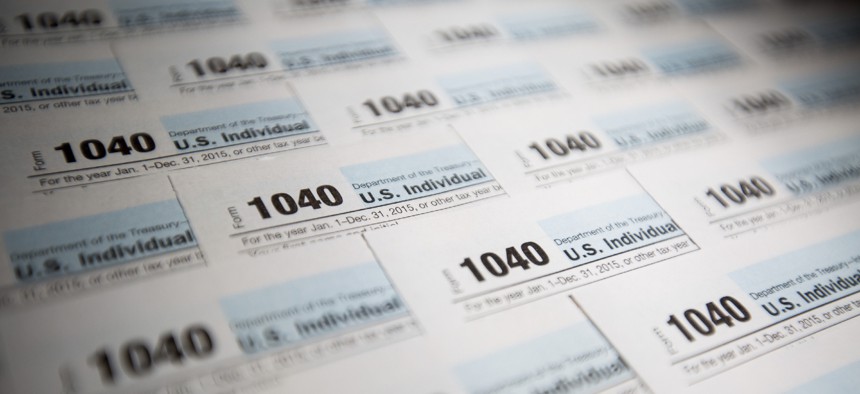
Michael Nagle/Bloomberg/Getty Images
IRS Hires 4,000 Customer Service Reps, Citing Inflation Reduction Act
Hiring surge for enforcement personnel likely coming next.
The Internal Revenue Service is already putting its cash infusion to use, hiring 4,000 customer service representatives from the new funding it received as part of the Democrats’ major climate change, health care and tax legislation.
The Inflation Reduction Act, which President Biden signed into law in August, will—with great notoriety—provide $80 billion to the tax agency over the next 10 years. A 2021 Treasury Department report suggested IRS could use the funding to hire up to 87,000 employees, which generated significant backlash—and significant backlash to the backlash.
Republican lawmakers cited the figure to highlight their opposition to the bill and to suggest Democrats were ushering in a new wave of audits and other IRS-initiated harassment. The hiring will not, in practice, grow the size of the IRS as much as the bill’s detractors have claimed: much of it will go to backfilling vacancies and replacing the up to 50,000 employees expected to leave the agency in the next few years.
Still, IRS has targeted customer service employees in its first swath of new hires. The agency expects to add another 1,000 to similar positions by the end of the year.
"The IRS is fully committed to providing the best service possible, and we are moving quickly to use new funding to help taxpayers during the busy tax season," said now former IRS Commissioner Chuck Rettig, who stepped down from his post on Friday. "Our phone lines have been simply overwhelmed during the pandemic, and we have been unable to provide the help that IRS employees want to give and that the nation's taxpayers deserve.”
The number of calls IRS received dropped by more than half this year, but it only grew its answer rate from 9% in 2021 to 10% in 2022. Individuals waited on hold for an average of 29 minutes, up from 20 minutes last year.
“Help is on the way for taxpayers,” Rettig said. “As the newly hired employees are trained and move online in 2023, we will have more assistors on the phone than any time in recent history."
The new employees are in various stages of being onboarded, IRS said. All of them have or will receive weeks of training upon joining the agency. The agency cited the Inflation Reduction Act for both funding the hires and allowing them to take place so quickly. The 4,000 hires were brought on in two months. Last year, the agency said, it took an average of eight months to fill customer service vacancies.
IRS said it is in the process of bringing on more employees across the agency, including enforcement and IT personnel. The Treasury Department has said it will formally unveil its operational plan for the hiring over the coming months, but stressed that process is well underway. In its 2021 report, Treasury said IRS would hire around 5,000 workers in the first year and slowly grow that to around 12,000 annually toward the end of the 10-year window.
Rettig previously vowed to act quickly to get new employees on board, telling lawmakers last year his agency has already spent months developing hiring plans so IRS can hit the ground running as soon as new funding is approved.
Initially, the Inflation Reduction Act included special hiring and pay authorities to allow IRS to quickly recruit and onboard new employees. Due to arcane Senate procedures, however, that language was stripped from the bill before it passed and President Biden signed it into law. Analysts at the Congressional Budget Office found it could have a dramatic impact: they lowered their projection of the new revenue IRS would bring in over the next 10 years by $23 billion. The reason, CBO said, was the law no longer containing personnel flexibilities “will cause the IRS to hire new personnel more slowly and could make hiring experienced candidates more difficult.”
The agency maintained temporary direct hire authority—which allows agencies to bypass many of the hurdles that typically slow down the hiring process—after Congress provided in the fiscal 2022 spending bill.
Rettig's resignation came just weeks before his term was set to expire. Treasury Secretary Janet Yellen announced Deputy Commissioner Douglas O'Donnell will serve as acting commissioner. Biden has yet to nominate a permanent replacement.







